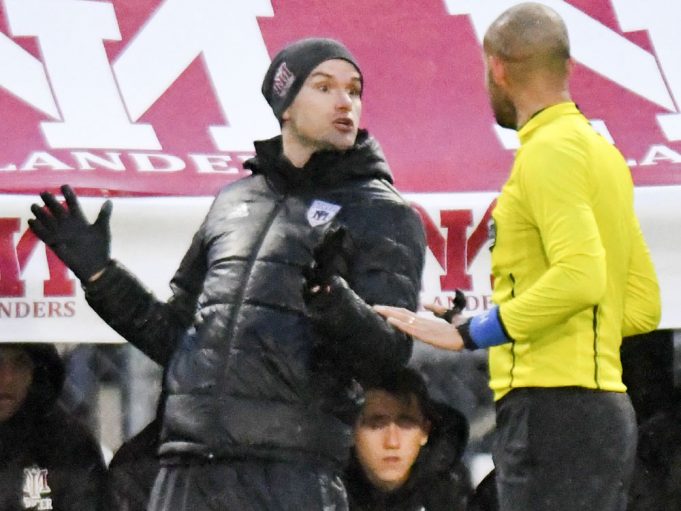Depending on your level of training and experience as a referee, communication may not seem to be a top priority for officiating games. However, behind knowledge of contest rules and game mechanics, referee/coach communication may be one of the most important tools for game management. As with all types of communication, the only reality that matters is the perceived reality.
The Pregame Conference
First impressions are everything. The coach/referee conference is an opportunity to demonstrate confidence, organization and professionalism. It’s shocking to hear that some officials choose to skip this meeting altogether, and some coaches report having to initiate it themselves. If possible, it’s best to call both coaches together for a common conference, putting everything out in the open and ensuring that they receive the same message.
Coaches may have different “wish lists” for the conversation before the game, but certain standards are a must at every level. All coaches want to see a crew that is organized and professional. They understand that referees are human and that mistakes may happen. At the high school level and below, most coaches are also able to accept that referees have varied levels of training and experience. What coaches cannot abide is evidence that a referee may have preconceived notions about a game before it begins.
Coach Logan Minshew of Fredericksburg (Texas) High School remembers a playoff game where a referee disclosed that he “normally (called) boys’ games.” This referee may have been used to calling for boys instead of girls, but the perception of the coach in that moment was that the referee was disinterested in the game that he was about to call. “I understand that it’s a completely different game,” Minshew said, “but I would never go to my team and say, ‘I normally coach boys, but I got assigned girls.’”
As an official, be careful not to say anything before the game that may be viewed as bias. John Brockway, head coach at Taylor (Texas) High School, put it this way: “The referee telling me that he knows something about the other team, or that he knows something about my team before the game, really turns me off.” Though you may have done your research in preparation for the game, it’s not advisable to discuss your viewpoint with the coaches. Coaches want objectivity from referees.
Coach Cory Maxwell of Marble Falls (Texas) High School also stressed the importance of addressing all procedural issues before the game begins. “Are your kids equipped? Where’s your administrator? Do we have an ambulance? Do we have water? Do we have the national anthem? Do we have roster announcements?” These are questions that Maxwell is impressed to hear from a referee before the game. “It’s the guys who lay it all out before the game starts … (that) make you feel more comfortable,” he said.
Building Relationships
Introducing the crew to both coaches shows that the center referee is the leader and mentor of a well-organized group. Most coaches will respect a leadership mentality, being leaders themselves, and they want to see cooperation and respect from all three referees.
When asked about the No. 1 factor that creates respect for a center referee, Coach Robert Lopez of Lonestar Soccer Club said, “The first thing is they organize their crew. I see them working and communicating … and they’re helping and educating their crew.” If it’s clear that a positive relationship exists among the members of the referee crew, a coach’s level of respect for that crew is likely to increase. If there is a lack of cooperation or signs of dissent among the referees, it adds fuel to any conflict that may arise during the game.
Brockway speaks about the value of a referee who is willing to build a sense of “kinship” with the coaches. “When a referee asks, ‘How’s your year going?’ or, ‘Is there anything I should know about the team?’ you can tell that he has some knowledge … and has some kind of soccer background.” Brockway notes that playing experience is an important element that allows coaches and referees “to have more of an understanding throughout the game.”
Coach Freddy Drago of Angelina College further stresses the bonds that develop between a coach and a referee who both have experience as players. The opposite is also true. Drago recalls a pregame conference before a college game where common ground was in the works until he made the comment, “You know, we’ve all played.” At this point, one of the ARs spoke out and said, “No, man, I used to do rodeo.” Admitting lack of playing experience can be an especially destructive comment at higher levels of play. A referee who hasn’t played at the level he’s calling can still have potential, but it’s another reason for doubt from the coach’s perspective, and it’s something that should probably go unsaid.
Don’t cross the lines of familiarity with coaches or players
It’s important not to cross the lines of familiarity with coaches or players. Address coaches by their professional titles, avoid calling players by name and do everything possible to appear objective. Though you may be aware of reputations involved, speaking openly about them only sows the seeds of doubt in a coach’s mind. Even as you remain impartial, the coach’s perceived reality is that the contest may not be called solely according to the Laws of the Game.
The Impact of Emotion
Though it can be tempting to shut down or to fire back when being hounded by a coach, a successful communicator and relationship-builder is willing to pause for a moment to address a coach’s concerns. Don’t ignore a coach who is asking a question. Even if it is as simple as saying, “Coach, I hear you, and I will do my best to watch that,” a referee should acknowledge the coach on the sideline.
Minshew mentioned the importance of being willing to discuss a critical call. “I think there are some times when you have a question about what they saw. I try to be as professional as I can, but I need to be able to address that information with my players.” Referees should realize that coach comments are not always personal challenges or dissent. Some coaches are just trying to collect information for their own game-management purposes.
Remember that it’s not about you, it’s about the teams. Show empathy for the players. An awarded penalty, a red card or a close offside decision can have an enormous impact on a game. Always strive to keep the game in check without drawing attention to yourself. Think about de-escalation so that you become a calming influence on the field. There’s never a reason to threaten cards or to tell coaches how to do their jobs. There’s never cause to point a finger or to place blame. Take on the role of the peacekeeper and see how it will improve the experience for all parties.
What's Your Call? Leave a Comment:
Note: This article is archival in nature. Rules, interpretations, mechanics, philosophies and other information may or may not be correct for the current year.
This article is the copyright of ©Referee Enterprises, Inc., and may not be republished in whole or in part online, in print or in any capacity without expressed written permission from Referee. The article is made available for educational use by individuals.


















